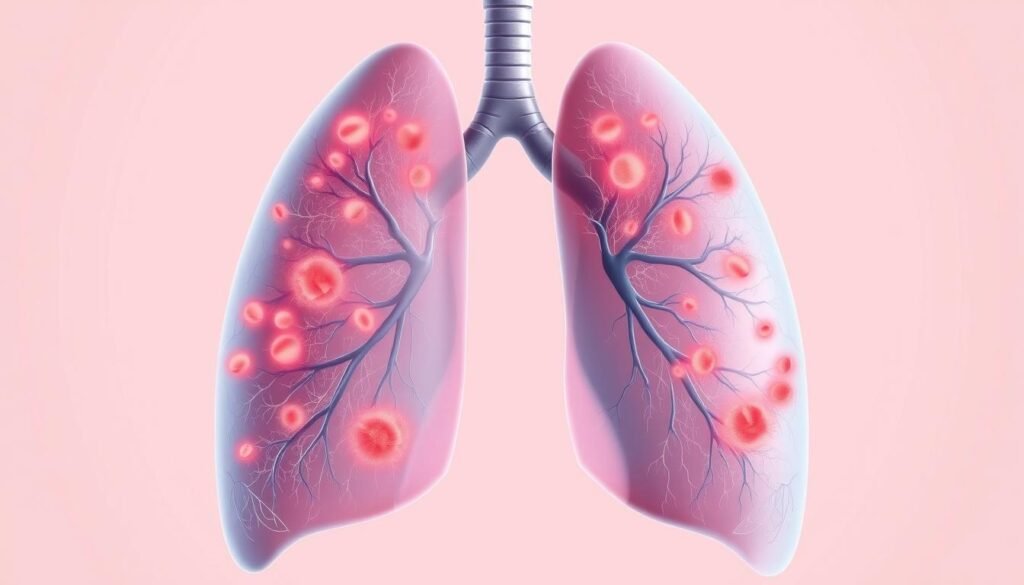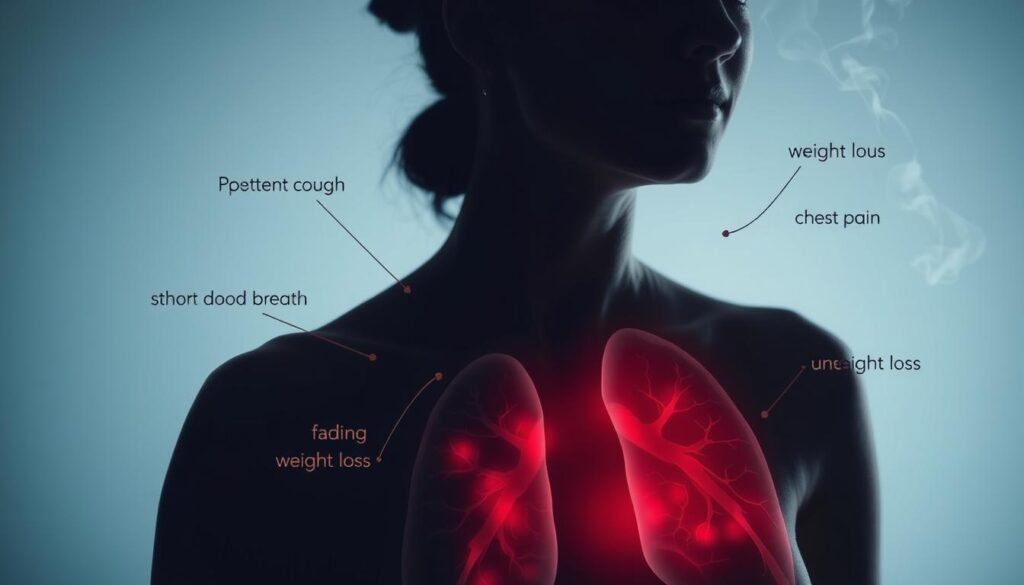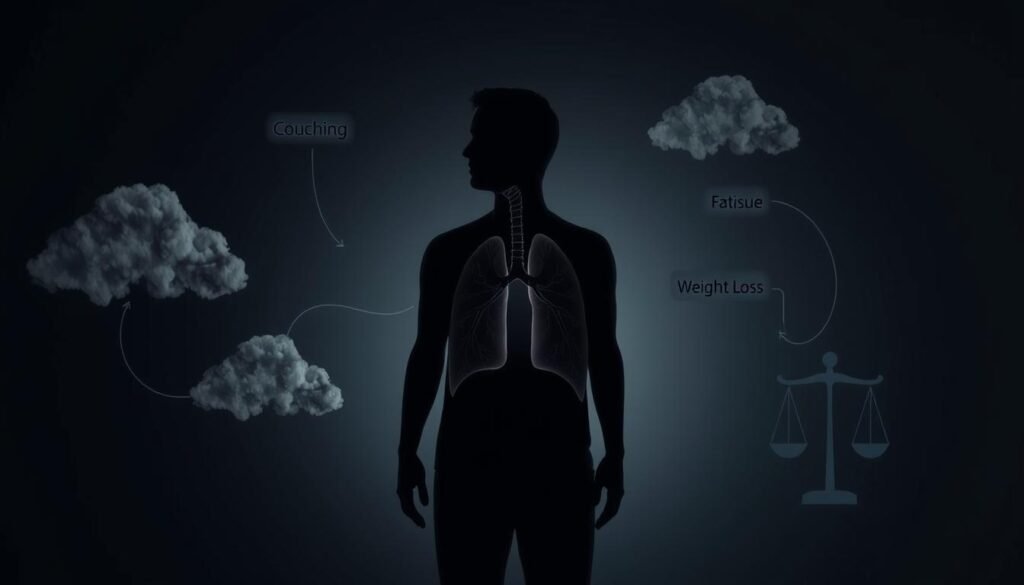About 70% of lung cancer patients show no symptoms until it’s late. This fact makes it crucial to know the early signs. Spotting them early can greatly help in fighting the disease. Symptoms can seem like common issues, so staying alert is important.
Look out for a continuous cough, losing weight without trying, and feeling short of breath. These signs should not be ignored. Recognizing them early can lead to faster help from doctors. This makes it vital to take any unusual body signals seriously.
Key Takeaways
- Most lung cancers remain asymptomatic until advanced stages.
- Recognizing early signs of lung cancer is crucial for better treatment outcomes.
- Common symptoms include persistent cough, shortness of breath, and unexplained weight loss.
- Immediate medical evaluation is essential when early lung cancer symptoms present.
- Understanding lung cancer symptoms can lead to quicker diagnosis and intervention.
Understanding Lung Cancer
Lung cancer is the top cause of cancer deaths for men and women in the USA. Knowing about lung cancer means learning about its types and traits. The main kinds are non-small cell lung cancer (NSCLC) and small cell lung cancer (SCLC). NSCLC makes up about 85% of cases. SCLC spreads fast and is more aggressive.
NSCLC has three subtypes: Adenocarcinoma, Squamous cell carcinoma, and Large cell carcinoma. Adenocarcinoma is often found in women, even those who’ve never smoked. The rise in adenocarcinoma cases shows how lung cancer is changing. Lung cancer risk comes mainly from smoking, job-related exposures, and environmental factors like radon.
Knowing about lung cancer helps people spot early signs and symptoms. Early screenings are key for those at higher risk. They greatly improve the chances of successful treatment. For information on early warning signs, check out this website for details.
Early Signs of Lung Cancer
Spotting early signs of lung cancer can be tricky. They often seem like normal breathing problems. Look out for a persistent cough, chest pain, and feeling out of breath. These signs can appear as cancer grows in the lungs. This might lead to finding out about the cancer later than we’d like. It’s vital to recognize these early signs to catch lung cancer quickly. Early detection can really help with treatment.
Other signs include feeling very tired and getting sick often. These lung cancer indicators should make you talk to a doctor, especially if they don’t go away. Going to the doctor early can make a big difference. It could mean finding the cancer early and having better chances at treatment.
Stay aware of any weird changes in your health. It’s key to know all possible lung cancer symptoms. Besides the more common signs, there might be a hoarse voice, not feeling hungry, or losing weight without trying. Finding lung cancer early is crucial. Check out more about it here.
Common Lung Cancer Symptoms
Knowing early signs of lung cancer is key for treatment. Some symptoms may show up early, but others don’t notice changes. Finding these signs early helps with successful treatment.
Cough That Persists
A long-lasting cough can be an early warning. It may get worse over time and sound like a smoker’s cough. This persistent cough could mean lung cancer, leading people to get help.
Chest Pain and Discomfort
Chest pain related to lung cancer can get worse when you breathe deeply or laugh. It might mean tumors are in the lungs. If you feel this pain, talk to a doctor about lung cancer.
Shortness of Breath
Some people start feeling out of breath slowly. This could happen because of a tumor or fluid in the lungs. If breathing hard affects your life, it’s important to get checked out. Knowing these symptoms helps you make safe health choices.
Signs and Symptoms of Lung Cancer
It’s vital to know the signs and symptoms of lung cancer early on. Many times, this illness doesn’t show symptoms at the start. But, certain signs should make you see a doctor. Watch for coughing up blood, sudden weight loss, and losing your appetite.
Coughing Up Blood
Coughing up blood is a serious warning. It means you need to see a doctor right away. This symptom is not only scary but could point to lung cancer or other severe lung issues. If you cough up blood, it’s crucial to get checked to understand what’s happening. The link here gives more info on lung cancer signs and symptoms.
Unexplained Weight Loss
If you’re losing weight without trying, it could be an early sign of lung cancer. This might happen because you’re not feeling hungry. Or, the cancer may make your body need more energy. Talk to your doctor if you notice you’re dropping weight quickly. It could be a clue to a health issue you need to address.
Loss of Appetite
Many people with lung cancer notice they don’t feel like eating. This lack of hunger can lead to losing weight. It can also affect your energy and overall health. If you’re not feeling hungry often, it’s important to check for lung cancer signs. Early detection can make a big difference.

| Symptom | Details |
|---|---|
| Coughing Up Blood | Possible indication of severe lung disease including lung cancer, needing immediate medical attention. |
| Unexplained Weight Loss | Can occur early in lung cancer due to decreased appetite or increased body demands. |
| Loss of Appetite | A common symptom that negatively affects overall health and can lead to weight loss. |
Symptoms of Lung Cancer in Men
Lung cancer symptoms in men have their own patterns. A persistent cough is often the first warning sign. It might start mild and get worse, signaling deeper problems. Men may also feel more tired than usual, even after light activities. This can really affect their daily lives.
Other signs include unexpected weight loss and less appetite. Men might stop wanting foods they used to like. As the disease gets worse, these signs become clearer.
Some men also feel chest pain. This can happen while coughing or even when quiet. It’s important to know these signs to get help early.
The following table outlines common lung cancer symptoms specific to men:
| Symptom | Description | Importance |
|---|---|---|
| Persistent Cough | A cough that does not go away or change over time. | Often the first notable symptom; warranting a prompt visit to a healthcare provider. |
| Fatigue | Increased tiredness affecting daily activities. | Common but significant, indicating underlying health issues. |
| Chest Pain | Discomfort in the chest, experienced intermittently or continuously. | Can suggest serious conditions; requires further investigation. |
| Weight Loss | Unintended reduction in body weight. | May signal early signs of lung cancer; important for diagnosis. |
| Loss of Appetite | Reduction in the desire to eat. | A critical warning sign that may accompany other symptoms. |
It’s vital to get screened regularly for lung cancer. Smoking greatly affects lung cancer rates in men. Knowing these signs can lead to early treatment and better chances of recovery.
Symptoms of Lung Cancer in Women
Knowing about lung cancer symptoms in women is key to finding it early. Often, these signs aren’t very obvious, which might delay finding out about the cancer. Women usually spot their symptoms sooner than men. This fact underlines the necessity to know what signs to look out for.
Distinct Presentation Differences
Women and men may notice different lung cancer symptoms. For women, feeling very tired is often the first clue. This fatigue is more intense than just feeling sleepy. It can make even simple tasks hard. Another common sign is struggling to breathe. This problem can affect day-to-day life. Pain in the back or shoulder also pops up early on. Sometimes, doctors look for other reasons for this pain, not knowing it’s because of lung cancer.
Women might get sick with respiratory issues often if they have lung cancer. These problems suggest something serious might be wrong. Coughing that doesn’t go away is less usual in women. It depends on where the tumor is. Hearing a wheeze in the breath could mean the tumor is blocking air. Coughing up blood is a serious warning sign. It happens to about 21% of women with lung cancer. It’s a symptom that needs quick action.

Studies show that many women with lung cancer never smoked. This means all women should be aware of lung cancer signs, no matter their smoking history. Often, these women are younger. It’s crucial to spread knowledge about lung cancer symptoms among women for better health.
| Symptom | Description | Frequency in Women |
|---|---|---|
| Fatigue | Extreme tiredness that does not improve with rest | Common |
| Shortness of Breath | Difficulty breathing or feeling breathless during activities | Common |
| Pain in Back or Shoulder | Discomfort in the back or shoulder area, can be persistent | Common |
| Recurrent Respiratory Infections | Frequent bouts of coughing, wheezing, or bronchitis | Common |
| Persistent Cough | Long-term cough that doesn’t go away, less common | Less Common |
| Coughing Up Blood | Presence of blood in sputum, indicates severe conditions | Present in 21% |
Warning Signs of Lung Cancer
It’s crucial to catch lung cancer early through its warning signs. A persistent cough that doesn’t go away is a key sign. This cough may happen along with frequent lung infections. These signs show the body is having a hard time fighting off diseases.
Unexpected weight loss is another red flag. If you lose 10 pounds or more without trying, it’s worrisome. It’s important to note any unexpected physical changes. And talking to a doctor about these changes is a must.
Also, a change in voice or finding new lumps near the neck or collarbone is alarming. This could mean the cancer has spread to lymph nodes. Feeling discomfort in the chest or shoulders, especially when coughing or doing daily activities, may indicate lung cancer has progressed.
Knowing and acting on these lung cancer symptoms is critical. Getting a full check-up by a doctor can catch it early, improving treatment success. For more information on spotting lung cancer early, look into early lung cancer signs.
Advanced Stage Symptoms of Lung Cancer
As lung cancer reaches its advanced stages, patients may start to see severe signs. Knowing these signs is key for getting help early and making life better. Advanced symptoms of lung cancer include:
Bone Pain and Neurological Changes
Bone pain often happens when lung cancer spreads to the bones. Patients feel this pain constantly and may have more pain in their joints or back. If cancer reaches the brain or spinal nerves, it might cause headaches, dizziness, or feeling numb. These serious signs show why catching lung cancer early and treating it quickly matters.
Signs Related to Spread of Cancer
Some other severe symptoms could be jaundice, swelling of lymph nodes, or trouble swallowing. These symptoms mean the cancer has moved to new areas, which may require a change in treatment plans. Knowing these signs helps patients and doctors tackle the disease better together.

| Symptom | Description | Potential Cause |
|---|---|---|
| Bone Pain | Persistent pain in bones or joints | Metastasis to bones |
| Neurological Changes | Headaches, dizziness, and numbness | Spread to brain or spinal nerves |
| Jaundice | Yellowing of the skin and eyes | Spread to the liver |
| Swelling of Lymph Nodes | Enlargement in lymph nodes | Metastatic spread |
| Difficulty Swallowing | Struggling to swallow food or liquids | Pressure from tumor growth |
Lung Cancer Signs in Adults
Adults need to watch out for lung cancer signs. Catching it early is key to better treatment success. Look out for a lasting cough, weight loss you can’t explain, and breathing troubles. A study showed 34.1% of adults lost a lot of weight before finding out they had cancer. This is alarming because it’s linked to lower chances of surviving.
Lung cancer sometimes doesn’t show symptoms until it’s advanced. Many lung cancers are silent until they spread. This makes regular checks important for high-risk people. This includes those who’ve smoked a lot or been around harmful substances. The CDC says smoking is behind 80% to 90% of lung cancer deaths.
Knowing early signs can help catch cancer soon, which can save lives. About half the people with lung cancer have a consistent cough. Coughing up blood happens in around 20% of cases. This can show up before any official diagnosis. Also, losing a lot of weight without trying is common in lung cancer patients. This often means losing 5% of your weight or over 10 pounds in less than a year.
Regular doctor visits and knowing lung cancer signs can improve survival. It’s important for adults to take any potential symptoms seriously and act quickly.
Conclusion
Knowing the symptoms of lung cancer is key in fighting this disease. It’s the third most common cancer in the U.S. and the top cause of cancer deaths. Recognizing early signs like constant coughing, chest pain, and sudden weight loss is crucial. This helps people seek medical help early and possibly get better treatment results.
Getting diagnosed early greatly increases the chances of survival, especially if the lung cancer is caught when it’s not spread. Studies show that survival rates for localized non-small cell lung carcinoma (NSCLC) can reach 65%. This fact shows how important it is for people to get screenings when they have risk factors.
Finally, being informed and careful about your health is very important. If someone has any symptoms we talked about, they should talk to a doctor right away. Quick action can make a big difference in survival and living a better life. This leads to improved health results for everyone.